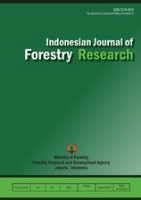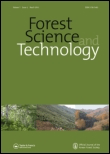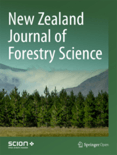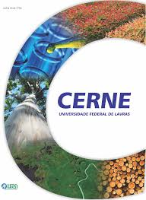
JOURNAL OF TROPICAL FOREST SCIENCE
Scope & Guideline
Bridging Research and Practice in Tropical Forestry
Introduction
Aims and Scopes
- Forest Ecology and Biodiversity:
Research focusing on the ecological dynamics, species diversity, and conservation of tropical forest ecosystems. This includes studies on species composition, population characteristics, and the impacts of human activities on biodiversity. - Forest Management and Conservation Strategies:
Exploration of effective management practices and conservation strategies for sustainable forest utilization, including community involvement and legal frameworks for forest certification. - Forest Physiology and Phenology:
Investigations into the physiological processes and phenological patterns of tropical trees, including growth responses to climatic variables and seasonal changes. - Wood Science and Technology:
Research on wood properties, processing technologies, and the utilization of timber from tropical species, including studies on mechanical and physical properties of wood. - Agroforestry and Sustainable Practices:
Studies that integrate forestry with agricultural practices, focusing on sustainable land-use strategies and the development of agro-techniques for forest restoration. - Impact of Climate Change:
Research addressing the effects of climate change on tropical forests, including carbon storage potential, phenological shifts, and resilience of forest ecosystems.
Trending and Emerging
- Climate Change Mitigation and Adaptation:
There is an increasing focus on research related to the role of tropical forests in carbon sequestration, climate resilience, and adaptation strategies, highlighting the importance of forests in climate change discussions. - Technological Advancements in Forestry:
Emerging studies utilize advanced technologies such as remote sensing, genetic analysis, and modeling approaches to enhance forest management and conservation efforts. - Community-Based Conservation:
Research emphasizing the involvement of local communities in forest management and conservation initiatives is on the rise, reflecting a shift towards participatory approaches. - Forest Restoration and Rehabilitation:
An emerging trend is the emphasis on restoration ecology, with studies focused on methods for rehabilitating degraded forest areas and enhancing biodiversity. - Ecological Services and Economic Valuation:
A growing area of interest is the assessment of ecosystem services provided by tropical forests and their economic valuation, indicating a trend towards integrating ecological and economic perspectives.
Declining or Waning
- Traditional Uses of Forest Products:
There has been a noticeable decline in studies focusing on traditional or indigenous uses of forest products, as the journal shifts towards more contemporary and applied research themes. - Invasive Species Management:
Research related to the management and impact of invasive species in tropical forests has decreased, possibly as a result of a broader focus on biodiversity conservation and ecosystem restoration. - Historical Ecology:
While important, historical ecology studies that examine past forest conditions and management practices are less frequently published, indicating a trend towards immediate ecological assessments and management practices.
Similar Journals

Indonesian Journal of Forestry Research
Empowering researchers with vital insights in ecology and forestry.The Indonesian Journal of Forestry Research is a distinguished, peer-reviewed academic journal published by the Ministry of Environment & Forestry of Indonesia. With an ISSN of 2355-7079 and E-ISSN 2406-8195, this journal has been an Open Access platform since 2014, fostering international collaboration and knowledge sharing in the fields of ecology and forestry. As of 2023, the journal holds a respectable Q3 category in both Ecology and Forestry, reflecting its contribution to the science community. It ranks #99/174 in Forestry and #305/461 in Ecology in Scopus, indicating its growing influence in the respective fields. Aimed at researchers, professionals, and students, the Indonesian Journal of Forestry Research provides vital insights and findings, supporting sustainable forestry practices and environmental management in Indonesia and beyond. With an emphasis on innovative methodologies and applied research, this journal stands as a pivotal resource for those dedicated to advancing forestry science and ecological research.

FORESTRY
Shaping the future of forestry with impactful insights.FORESTRY is a prestigious journal dedicated to the advancing knowledge and innovative practices in the field of forestry, published by Oxford University Press. Established in 1927, it encompasses a rich history of scholarly contributions and has evolved to maintain its relevance, addressing contemporary issues and research in forestry and related disciplines. With an impressive Q1 ranking in the category of Forestry, this journal holds a notable position within the Scopus rankings, being placed 20th out of 174 in the Agricultural and Biological Sciences domain, highlighting its significant impact with an 88th percentile standing. Researchers, professionals, and students can access critical insights into forestry management, ecology, and policy, facilitating informed decision-making and fostering sustainable practices. While Open Access options are currently not available, the journal's rigorous peer-review process ensures the publication of high-quality research that contributes both to academic advancement and practical applications in forestry worldwide. The comprehensive coverage from 1927 to 2024 makes FORESTRY an invaluable resource for anyone invested in enhancing the field of forestry.

Acta Silvae et Ligni
Empowering Sustainable Solutions through Open Access ResearchActa Silvae et Ligni is a prominent open access journal dedicated to the field of forestry and wood science, published by the esteemed GOZDARSKI INST SLOVENIJE. Since its inception in 2013, the journal has been committed to disseminating high-quality research that provides valuable insights into sustainable forest management, wood properties, and environmental interactions. With its ISSN 2335-3112 and E-ISSN 2335-3953, it serves as a vital resource for researchers, professionals, and students alike, fostering academic collaboration and innovation. The journal’s commitment to open access ensures that research is freely available to a global audience, promoting knowledge sharing and driving advancements in the field. While awaiting formal Scopus rankings, Acta Silvae et Ligni is actively working to enhance its impact and reach, making it a crucial platform for those engaged in the study and management of forest resources.

Austrian Journal of Forest Science
Connecting academia and practice in forestry science.Austrian Journal of Forest Science, published by OSTERREICHISCHER AGRARVERLAG, is a distinguished peer-reviewed journal dedicated to advancing knowledge in the fields of forestry and ecological science. With an ISSN of 0379-5292 and an E-ISSN of 0375-524X, this journal serves as a vital platform for researchers, professionals, and students alike, aiming to disseminate innovative research findings, methodologies, and case studies pertinent to forest conservation, management, and policy. Situated in Austria, its diverse scope encompasses critical topics within ecology, evolution, and biodiversity, evidenced by its competitive quartile rankings in 2023, placing it in Q2 for Forestry and Q3 in other related fields. The journal is committed to fostering a deeper understanding of forest ecosystems, making it an essential resource for anyone invested in sustainable forestry practices and environmental policy.

Forest Science and Technology
Elevating forestry knowledge to tackle global challenges.Forest Science and Technology is a premier open access journal published by Taylor & Francis Ltd, based in the United Kingdom. Established in 2005, this journal has become a key platform for disseminating high-quality research in the fields of Forestry and Environmental Science, maintaining a strong impact factor and impressive Scopus rankings. As of 2023, it proudly holds a Q2 quartile ranking in Forestry and a Q3 quartile ranking in Management, Policy, and Law categories, highlighting its significance in addressing contemporary challenges in forest management and conservation. With a dedication to fostering scholarly communication, the journal supports open access since 2017, making valuable findings accessible to a wider audience, including researchers, professionals, and students. With the coverage period extending to 2024, Forest Science and Technology continues to contribute to the discourse on sustainable forestry practices and innovative management strategies.

BOIS ET FORETS DES TROPIQUES
Bridging Science and Practice in Tropical ForestryBOIS ET FORETS DES TROPIQUES is a distinguished journal published by CIRAD-CENTRE COOPERATION INT RECHERCHE AGRONOMIQUE POUR, based in France. The journal is committed to disseminating high-quality research in the domains of ecology, forestry, and environmental science, reflected by its impressive ranking in multiple Scopus categories, including Q2 in Forestry and Q3 in Ecology. With an ISSN of 0006-579X and an e-ISSN of 1777-5760, BOIS ET FORETS DES TROPIQUES serves as a vital platform for scholars and practitioners to explore and share insights about tropical forests and their ecosystems. Although it operates under a subscription model without open access options, the journal plays a crucial role in advancing research and practices essential for sustainable forest management and biodiversity conservation in tropical regions. Its ongoing publication from 2010 to 2024 ensures a continuous contribution to the academic community, fostering a deeper understanding of ecological dynamics and promoting innovative approaches within the field.

ANNALS OF FOREST SCIENCE
Elevating the Science of Forests and EcologyANNALS OF FOREST SCIENCE, published by Springer France, stands at the forefront of ecological research, contributing significantly to both the fields of Ecology and Forestry, as evidenced by its prestigious Q1 ranking in both categories for 2023. Since its inception in 1999, this journal has become an essential resource for academics, practitioners, and students who are eager to explore the complexities of forest ecosystems and their interactions with global environmental changes. With an ISSN of 1286-4560 and E-ISSN 1297-966X, it disseminates cutting-edge research and critical reviews that enhance our understanding of forest science. Although it does not offer open access, the journal continues to be a pivotal platform for presenting innovative scientific findings that address the pressing challenges of forest management and conservation. Its significant impact factor reflects the high-quality contributions that have made a lasting mark on the discipline.

NEW ZEALAND JOURNAL OF FORESTRY SCIENCE
Catalyzing Scholarly Dialogue in Forestry ScienceNEW ZEALAND JOURNAL OF FORESTRY SCIENCE (ISSN: 0048-0134; E-ISSN: 1179-5395), published by SCION, stands as a pivotal resource for researchers, professionals, and students dedicated to the fields of forestry, ecology, and plant sciences. With a strong commitment to open access since 2013, the journal promotes the dissemination of high-quality research and innovative practices within these disciplines, thereby fostering a greater understanding of the natural environment. The journal has achieved commendable rankings, being placed in the Q2 category in Ecology, Forestry, and Plant Science, reflecting its significant contribution to advancing knowledge and best practices in these areas. Based in Switzerland and published by SCION, a trusted name in forest research, the journal plays an integral role in shaping the dialogue around sustainable forest management and ecological conservation. As such, it serves as an essential platform for scholarly discourse and a valuable resource for anyone engaged in forestry and environmental studies.

Cerne
Fostering Collaboration for a Sustainable Forestry FutureCerne is a distinguished open-access journal dedicated to advancing knowledge in the field of forestry, published by the Universidade Federal de Lavras (UFLA). Since its inception in 1994, the journal has actively contributed to the global discourse on sustainable forest management and biodiversity conservation, presenting research findings that are both relevant and impactful. With its ISSN 0104-7760, Cerne aims to foster collaboration among researchers, professionals, and students, enhancing the understanding of forestry practices in Brazil and beyond. As of 2023, it holds a respectable Q3 ranking in the forestry category, further cementing its position within the academic community, illustrated by a Scopus ranking of #97 out of 174 in the Agricultural and Biological Sciences - Forestry field. Operating under an open-access model allows for wide dissemination of research outputs, ensuring that critical findings reach a broad audience, fueling further innovation and discovery in the field. With converged years extending from 2007 to 2024, Cerne continues to be a vital resource for anyone engaged in forestry research and practices.

NEW FORESTS
Fostering Collaboration for Healthier Forests.NEW FORESTS, published by SPRINGER, stands at the forefront of forestry research, delivering cutting-edge insights into forest science, management, and conservation. With an ISSN of 0169-4286 and an E-ISSN of 1573-5095, this esteemed journal has earned a distinguished reputation as it continues to contribute significantly to the field since its inception in 1986. As evidenced by its impressive ranking in the Q1 category for Forestry and being positioned at #32/174 in the Scopus Ranks for Agricultural and Biological Sciences, NEW FORESTS maintains an 81st percentile standing, emphasizing its influential role in advancing scientific discourse. The journal focuses on a diverse array of topics within the realm of forestry, making it an essential resource for researchers, professionals, and students eager to engage with contemporary developments and challenges in forest ecosystems. Although it is not an open-access journal, access to its articles can be facilitated through various academic institutions and libraries, ensuring that vital research is available to a broad audience. As we look toward the future, NEW FORESTS continues to strive for excellence, fostering dialogue and collaboration among scholars committed to sustainable forest management and restoration until at least 2024.